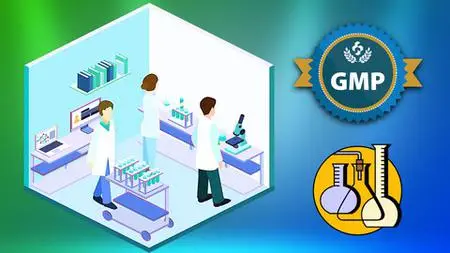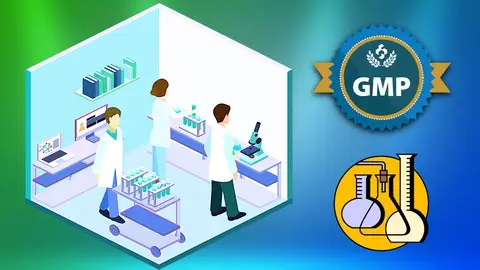Good Manufacturing Practices (Gmp) Pharmaceutical Industry
Published 12/2022
MP4 | Video: h264, 1280x720 | Audio: AAC, 44.1 KHz
Language: English | Size: 3.71 GB | Duration: 7h 39m
Published 12/2022
MP4 | Video: h264, 1280x720 | Audio: AAC, 44.1 KHz
Language: English | Size: 3.71 GB | Duration: 7h 39m
Certification course for Good Manufacturing Practices (GMP) in Pharmaceutical Food Industries
What you'll learn
Learn Quality Management System and Risk Management
Know the most important pharmaceutical regulations and their importance
Get a detailed overview of GMP requirements in the pharmaceutical industry
Learn the technical terms in the GMP area and their meanings.
Importance of GMP in the Manufacturing and Pharmaceutical Industry.
Learn the most important considerations for GMP audits
Learn Finished Pharmaceuticals General Provisions
Learn Production and Process Controls
Learn how to manage the clinical trials supplies
Master the key skills to outsource and find contractors
Pharmaceutical Facilities management
Requirements
A desire to learn all Good Manufacturing Practices
Description
Welcome to the complete Good Manufacturing Practice (GMP) course. This course is a complete guide for learning the most important requirements for following the GMP for the Pharmaceuticals and the Food Industry. GMP or good manufacturing practices followed by businesses involved in manufacturing of cosmetics food and pharmaceutical products. It is designed to maintain quality during production. Not complying with the good manufacturing practices can result in poor product quality and distrust the production in your organization. This course will cover the following sections:Current Good Manufacturing PracticesThis section addresses Food and Drug Administration (FDA) and a few different federal policies which have been promulgated for statutory effectuation and implementation withinside the main. The most important statute underlying such policies is the Federal Food, Drug, and Cosmetic (FFDC) Act. This phase offers a particular hints and ideas which could function assessments for crucial operations in the complete employer just so powerful and incorporated great structures and product controls may be achieved. Each requirement this is loosely generalized in GMP policies may be enlarged and made greater precise as a way to encompass measures that the authors consider are essential for appropriate manipulate structures.Quality Management System and Risk ManagementThis section will cover the two recent Food and Drug Administration (FDA) Guidance Documents on Quality Systems Approaches: Quality Systems Approach to Pharmaceutical Current Good Manufacturing Practice Regulations, September 2006, Final Guidance and Compliance Program Guidance Manual for FDA Staff: Drug Manufacturing Inspections Program 7356.002. These documents provide much insight into the FDA’s current thinking and change in approach since the introduction of their Pharmaceutical Current Good Manufacturing Practices (CGMPs) for the 21st century initiative. To understand quality systems in practice also requires knowledge of fundamental work processes and process management. This chapter will explore the intent of the guidance documents and application to pharmaceutical quality systems and processes.Management Responsibility and ControlRisk must be managed. There's no better approach than a purposeful management system that provides actionable data for your company to know where its day-to-day operations are at all times. This section provides a model for building a practical and effective management system to meet this expectation. I understand the rationale for FDA's requirement that administrators be responsible for oversight and control.Quality Control UnitIn this section we will focus on the Quality Control Unit. The QCU is an essential support function for the manufacturing process and the responsibilities are broad. A QCU must have adequate laboratory facilities to effectively carry out its duties. It is interesting that this is being done in the realm of quality authorities and not in the realm of general laboratory testing. This can be interpreted as permitting the use of external contract laboratories where competence or expertise is required, but these must be fully evaluated according to procedures and approved prior to use.Finished Pharmaceuticals General ProvisionsThe regulations in this section contain the minimum current good manufacturing practice for preparation of drug products for administration to humans or animals.Production and Process ControlsThis section provides a clear overview on how to write procedures, calculate yield and identify equipment. You will learn how to test your materials and drug products, how to control microbiological contaminations and reprocessing. Records and ReportsHere you will learn how to log and record all processes part of the GMP for Pharmaceuticals. You will be able to generate component, closure, batch/master production, lab and distribution records. You will master the development of use logs from equipment cleaning and the creation of complaint files. Clinical Trials SuppliesGood manufacturing practice (GMP) stands for good documentation, good housekeeping, and good scientific practices, regardless of the end-user of a drug. Unique requirements for test methods create opportunities for innovative approaches to regulatory compliance. Additionally, because of the potential problems with visually similar containers and packaging with similar labels, creatively incorporate current Good Manufacturing Practice (CGMP) principles and concepts into the clinical trial material (CTM) supply process. Adoption is just good business practice.Contracting and OutsourcingOne thing that is common to the small virtual company and the multinational company marketing commercial product is that they both use contractors and outsource one or more operations. The section discusses different topics related to outsourcing manufacturing operations and can be adapted for individual processes that are outsourced to a contractor.Pharmaceutical FacilitiesLearn how to design and construct your pharmaceutical facility. We will cover all requirements for lighting ventilation, plumbing, washing, sanitation and more. You will be able to manage and maintain your facility and make sure it meets the FDA guidelines.EquipmentWe will look at the different types of equipment . You will learn how to construct, clean and maintain your equipment. We will cover automatic, electrical and mechanical equipment that you need in your facility. The development of Good Automation Manufacturing Practice (GAMP) guidelines and calibration program guidelines has substantially transformed the process used, not only for the procurement and qualification of computer systems but also the entire system for the acquisition of equipment and systems.
Overview
Section 1: Current Good Manufacturing Practices
Lecture 1 What are GMPS
Lecture 2 The Meaning of "Current"
Lecture 3 Specific Drug Categories and Topics
Section 2: Quality Management System and Risk Management
Lecture 4 Quality Management Systems and Risk management
Lecture 5 Key Process/Systems Elements
Lecture 6 Quality Risk Management
Section 3: Management Responsibility and Control
Lecture 7 Management Responsibility and Control
Lecture 8 The Quality Management Triad Model
Section 4: Quality Control Unit
Lecture 9 Responsibilities of Quality Control Unit
Lecture 10 Warning Letter Citations Specifically for QCU
Lecture 11 Expectations for Training and Training Systems in a GMP Environment
Lecture 12 Curricula
Lecture 13 Training Plans
Lecture 14 Instructional Design
Lecture 15 Qualified Trainers
Lecture 16 Records
Lecture 17 Contractors and Consultants
Section 5: Finished Pharmaceuticals General Provisions
Lecture 18 Dietary Supplements
Lecture 19 Homeopatic Drugs
Section 6: Production and Process Controls
Lecture 20 Written Procedures Deviations
Lecture 21 Charge-in of Components
Lecture 22 Equipment Identification
Lecture 23 Time Limitations on Production
Lecture 24 Validation of Aseptic Processing
Lecture 25 Validation of Ethylene Oxide Sterilization
Section 7: Records and Reports
Lecture 26 Records and Reports
Lecture 27 Equipment Cleaning and Use Log
Lecture 28 Batch Production and Control Records
Lecture 29 Events, Deviations and Investigations
Lecture 30 Details and More Details
Lecture 31 Distribution
Section 8: Clinical Trials Supplies
Lecture 32 Introduction
Lecture 33 Application of a CGMP Conceptual Model to CTM Production
Lecture 34 Equipment
Section 9: Contracting and Outsourcing
Lecture 35 Contracting and Outsourcing
Lecture 36 Outsourcing Process
Lecture 37 Other Types of Contractors
Section 10: Pharmaceutical Facilities
Lecture 38 Design and Construction Features
Lecture 39 Lighting
Lecture 40 Sanitation
Section 11: Equipment
Lecture 41 Introduction
Lecture 42 Maintenance and Calibration Process
Lecture 43 Calibration Programs
Lecture 44 Automatic, Mechanical and Electrical Equipment
Pharmaceutical industry professionals,Professionals interested in starting a career in the pharmaceutical industry,Manufacturing engineering students,Manufacturing professionals,CfPIEs,Professionals in the sphere of biology and chemistry,Graduates, Postgraduates and PhD. Students with pharmacy or medical degrees,Production managers and employees,Entrepreneurs or any professional working in food and/or drug manufacturing premises



